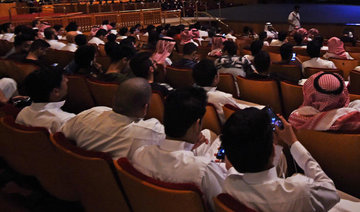ISLAMABAD: Forget Hollywood, forget Bollywood — one of the first films to hit Saudi screens when cinemas reopen next year will be from Pakistan.
Parchi is an ensemble action/thriller-comedy starring Hareem Farooq, Ali Rehman Khan and Shafqat Cheema.
“We feel honored and proud that we are among the first, it’s pretty exciting and it is quite an achievement,” Farooq, also a co-producer of the movie, told Arab News.
“We always aim to do something new and expand our reach, not just stick to Pakistan.”
Pakistan is noted for outstanding drama and television plays, but film has lacked investment, storylines, direction and quality content. Now, however, the movie business is enjoying a revival.
The impact of going international is not lost on Farooq. “I think it’s proof that Pakistani cinema has international appeal, it shows that we are on the right track and that we do have a great future.”
In addition to commercial success, films are changing some of the conversation about Pakistan. “We always want to put Pakistan on the global map in a good light, that is what we work for,” Farooq said.
“Cinema is a platform that can change mindsets — it’s huge and plays a mighty role in our image projection abroad. All the world sees is extremism and terrorism, they don’t get to see what Pakistan is really about.
“We are as crazy and as normal as everywhere else.”
The soundtrack from Parchi has been well received, and the first single, Billo Hai, already has more than a million views on YouTube. The movie itself will be released on Jan. 5 in Pakistan and the UAE, and Jan.12 in the US. Cinemas in Saudi Arabia will reopen early next year after a 35-year ban.
Arab News has emailed the Saudi Ministry of Culture and Information for a confirmation about the film but no response has been received by the time of printing.
Lights, camera, action: Pakistani stars head for Saudi cinemas
Lights, camera, action: Pakistani stars head for Saudi cinemas

International brands turn to Riyadh to expand cooperation

- Capital cements role as hub at World Defense Show
RIYADH: Saudi Arabia's capital is cementing its role as a rising hub in the global defense industry, and the World Defense Show has attracted international brands eager to showcase advanced technologies and expand partnerships in the Kingdom and beyond.
Held under the patronage of the Saudi leadership, the show — which runs until Feb. 12 — has brought together defense manufacturers, technology innovators and government representatives from around the world.
Arab News spoke to several international exhibitors who underscored the show’s growing importance as a gateway to pursue regional and global cooperation.
Among the returning participants is Passtech Machine Tools, represented by Syed Zahid, its sales manager.

The company collaborates with various international brands, providing tools, machines and gauges, including advanced CNC (computer numerical control) machinery from South Korea.
For Zahid, WDS has proved to be a strategic platform, and he said: “This is our third time. We see it as very, very useful.”
From China, Jihua Group Co. Ltd. showcases advanced navigation devices and integrated systems. Peter Wang, its senior product manager, expressed optimism about expanding cooperation.
At the company’s booth, Arab News was introduced to several technologies, including what Wang described as a “true-color navigation device.”
Highlighting a wearable system, Wang said it was designed to enhance mobility and operational efficiency.

He emphasized the diversity of visitors and the potential for cross-border cooperation, and added: “I meet different countries’ customers here. I’m very happy and I want to get some opportunities for cooperation.”
Turkiye is also represented at the event. Masttech, which is attending WDS for the first time, is showcasing its products for visitors.
Deputy General Manager Sitki Tuzun said: “We are here to show all our products. We are producing electromechanical, mechanical and pneumatic mast systems here.”
While the company does not yet have Saudi clients, Tuzun made it clear that the show was a strategic leap toward entering the market.
“We are here for connection and new business cooperation,” he said.

The World Defense Show has demonstrated its increasing influence as a platform from which global brands meet regional opportunity.
Beyond static displays, the show serves as a dynamic networking arena, connecting manufacturers, suppliers, and defense stakeholders under one roof.
As Saudi Arabia accelerates efforts to localize its defense industry and invest in advanced technologies, WDS continues to facilitate partnerships, technology transfer and international collaboration — reinforcing Riyadh’s emergence as a central node in the global defense ecosystem.










